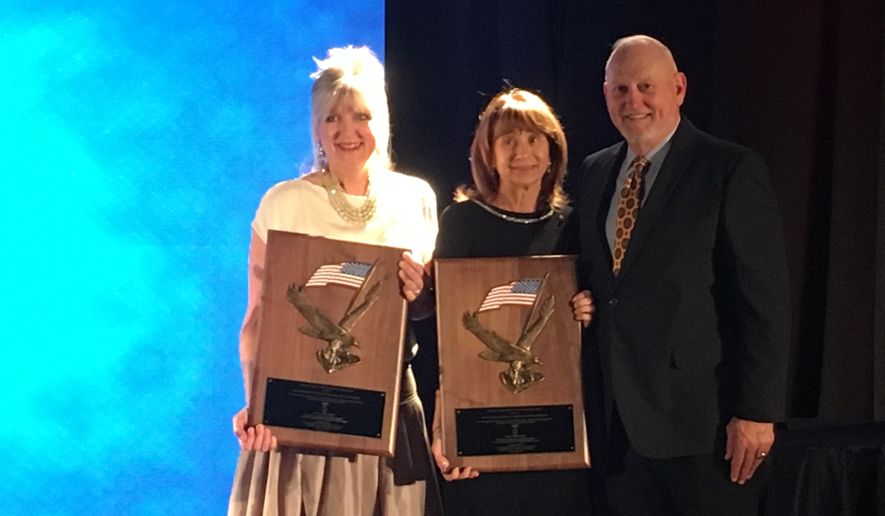Stephanie Shughart didn’t know where her husband had gone, nor was she privy to the extreme danger he and his fellow soldiers were in.
It was only after the Battle of Mogadishu had claimed the lives of 19 U.S. servicemen that she learned the full extent of American intervention in Somalia and of the unbelievable courage her husband, Randy, displayed during one of the most gruesome and often-overlooked events in American military history.
“We were not told where our husbands were going, no discussion of where they were going, what they were going to do,” Ms. Shughart told The Washington Times on Thursday. “Most Americans did not know there was a problem in Somalia. … They never gave the sense they were going to be in imminent danger.”
Ms. Shughart and Carmen Gordon, whose husband, Gary, also was killed during the battle, on Thursday night accepted on behalf of their late husbands the Defender of Freedom award from the Freedom Alliance, a Washington-area group that offers financial aid and support to students whose fathers have been killed or seriously injured in the line of duty.
The organization also honors service members such as Shughart and Gordon who give up their lives for their country.
Hours before accepting the award, an emotional Ms. Gordon told The Times that the pain lingers 25 years after the battle.
“You question humanity,” she said. “It’s not just that we lost our husbands. That’s hard enough. It’s all that went with it. Those horrible memories get brought up, and for me personally … I was always trying to find some sense of closure. My husband was returned in a box. I never even got to see him.”
Much like the American public, Ms. Shughart and Ms. Gordon were unaware of the details surrounding U.S. military operations in Somalia. By October 1993, about 1,200 U.S. troops were in the country under orders from President Bill Clinton. Their mission was to capture or kill Somali warlord Mohamed Farrah Aidid, who had drawn the attention of the U.S. and the United Nations while ruling the area in and around Mogadishu with an iron fist and turning swaths of the country into violent, lawless territory.
On Oct. 3, Randy Shughart, Gary Gordon and other soldiers with Army Task Force Ranger embarked on a mission to capture several of Aidid’s top aides. The battle — emblazoned in pop culture with the book and film “Black Hawk Down,” a reference to the U.S. helicopters shot down during a firefight with Aidid’s forces — quickly went south, with 19 Americans killed and more than 70 wounded.
It’s difficult to overstate the sheer bravery displayed by Shughart and Gordon during the battle. The two men voluntarily exited their helicopter and hit the ground to set up a protective perimeter around the crash site of a downed Black Hawk.
The likelihood of escaping the situation alive was low, and they knew it.
“When they left that helicopter, they knew the dire circumstances they were entering into,” Ms. Shughart said.
Beyond the personal sacrifices, the events influenced American foreign policy for the next decade.
With images of U.S. soldiers being dragged through the streets of Mogadishu on TV screens and magazine covers, Mr. Clinton quickly pulled American troops out of the country, effectively ceding much of Somalia to warlords such as Aidid.
Much of the country hasn’t fully recovered, and Somalia has become a breeding ground for terrorism. The U.S. once again has a military presence in the country. One soldier was killed and four others wounded in June in a firefight with al-Shabab militants, one example of continued hostilities in the nation.
For Ms. Shughart and Ms. Gordon, their husbands were among the first victims of a decadeslong battle with extremism.
“I care to this day,” Ms. Shughart said. “The salient point is that we are still fighting the same enemy and it is almost three decades later. … The war on terror did not start on 9/11.”
“It took our husbands that day,” Ms. Gordon added.
Freedom Alliance President Thomas Kilgannon said honoring the memories of Shughart and Gordon is important and that Americans need to be reminded of the sacrifices made during conflicts that no longer command constant media attention.
“Even 25 years later, it’s still painful,” he said. “We have to understand that those who are fighting today and serving and sacrificing, that just because the conflict is not on the front page it doesn’t mean the pain doesn’t exist. That’s important to understand.”
The pain of losing a husband in combat, Ms. Shughart and Ms. Gordon said, is unspeakable. But it was made worse by the nonstop media coverage of the events, particularly the brutal images of dead Americans being paraded through the streets.
“How can humans be so cruel to one another?” Ms. Gordon said. “You never forget that. I remember being in an airport, having to go to a memorial [service], and seeing a magazine, and seeing one of the soldiers on it and thinking … ’Whose husband is that?’ “
The women said Thursday night’s award honoring their husbands’ bravery and sacrifice helps ease the pain of their loss.
“It’s like you had this huge gunshot wound in your chest, in your heart,” Ms. Shughart said. “And then, over time, it gets smaller and smaller. And then, for me, that wound has become a scar. And oftentimes I could just visually imagine running my thumb across that scar, and that scar just reminds me of the wonderful love we shared.”
• Ben Wolfgang can be reached at bwolfgang@washingtontimes.com.




Please read our comment policy before commenting.